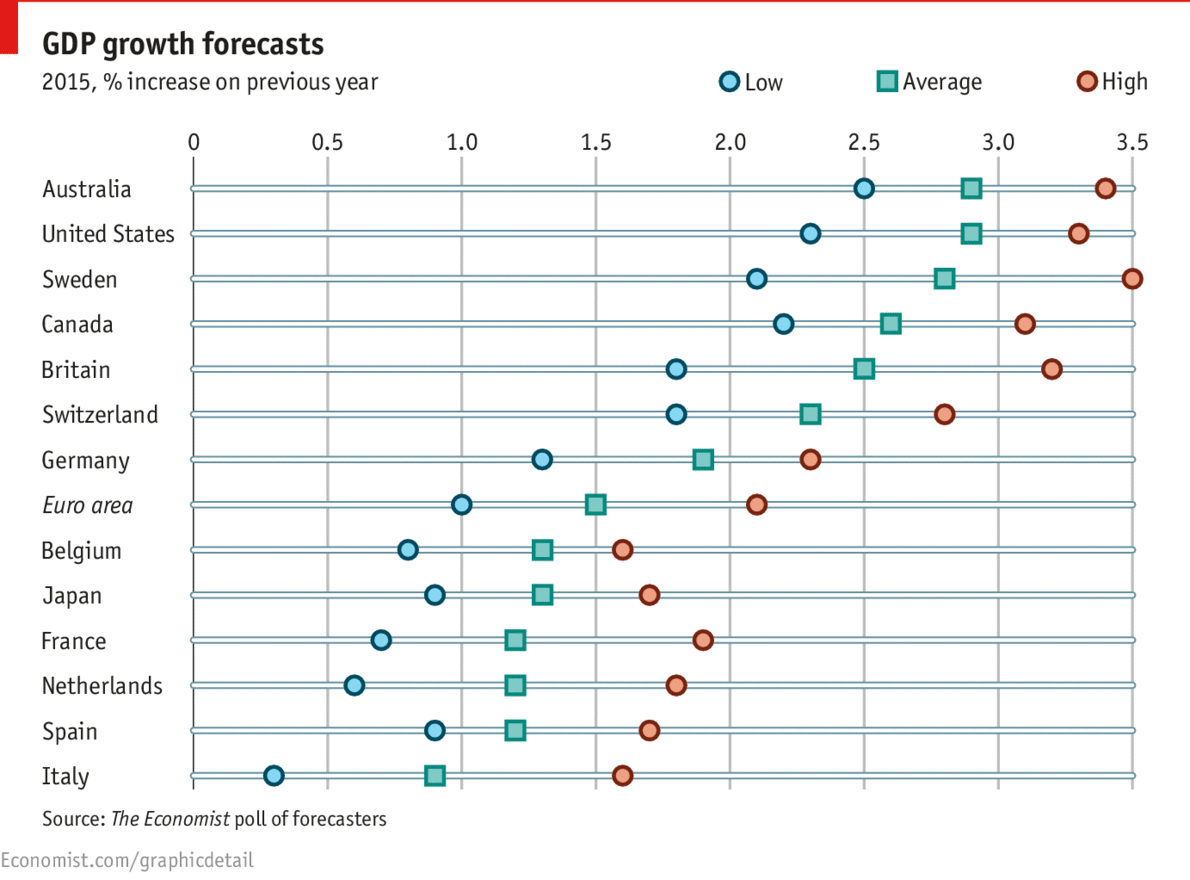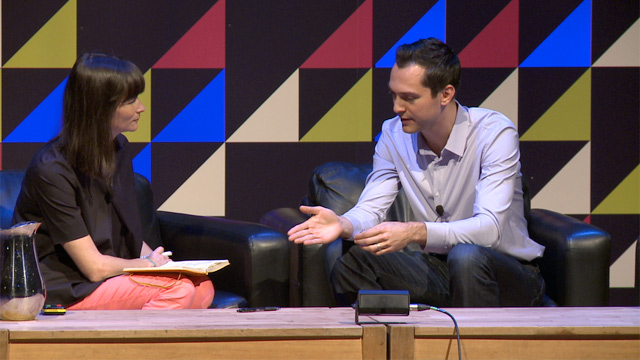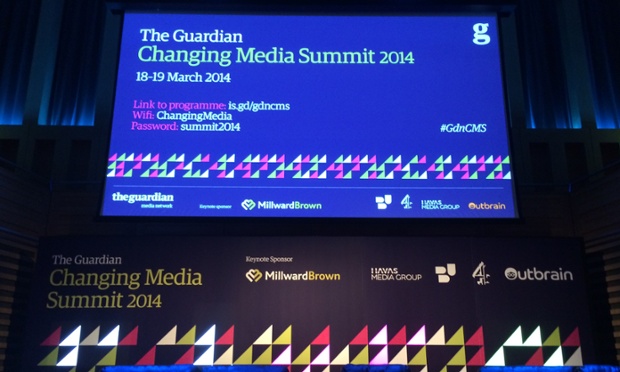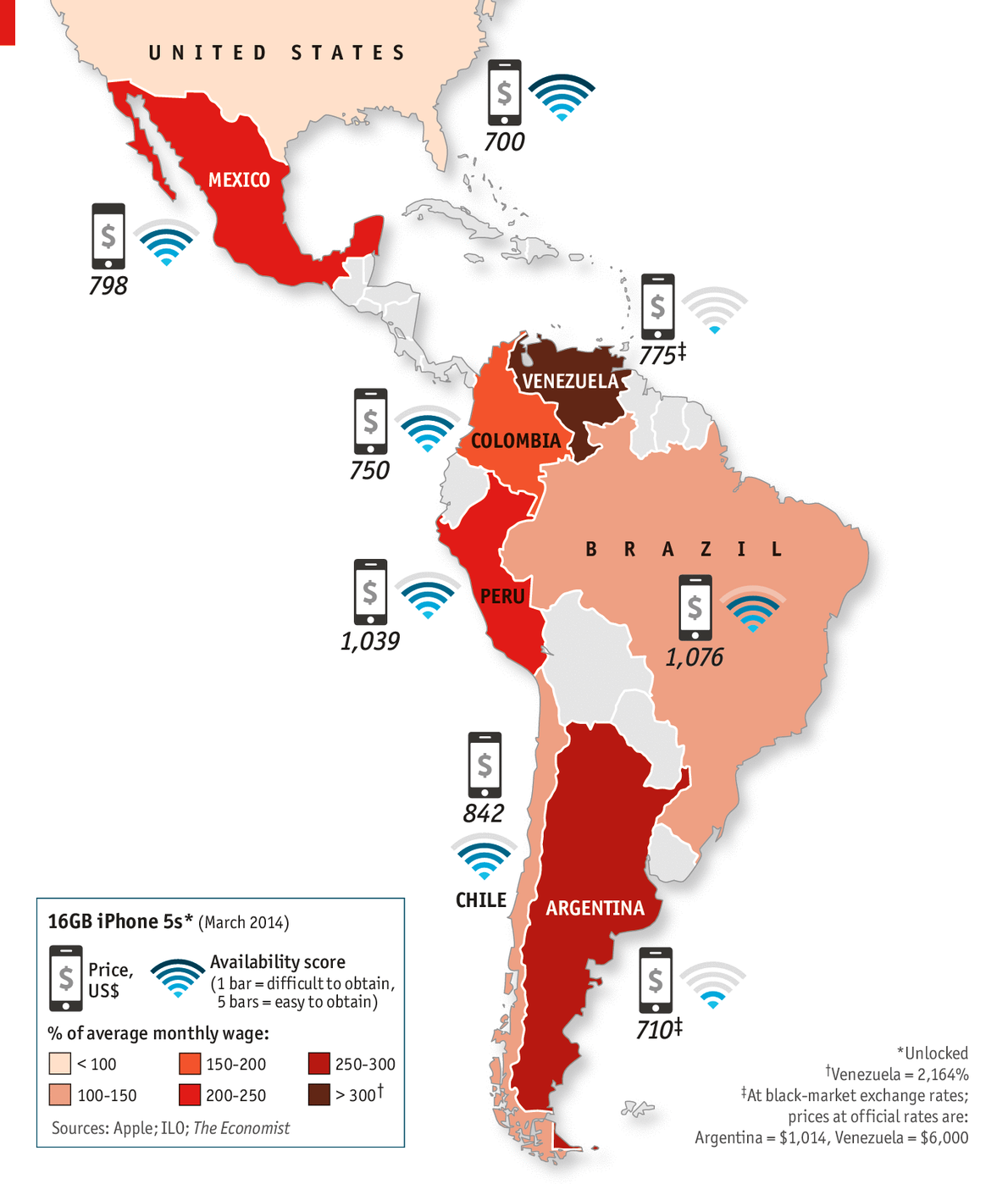Tim Waterstone has announced the decline of digital books. But there is still so much more they could do, if only publishers were more inventive and less lazy, says Gaby Wood
Monday, March 31, 2014
'The ebook revolution hasn't even begun'
Tim Waterstone has announced the decline of digital books. But there is still so much more they could do, if only publishers were more inventive and less lazy, says Gaby Wood
Frozen: inside Disney's billion-dollar social media hit
http://www.telegraph.co.uk/culture/film/10668942/Frozen-inside-Disneys-billion-dollar-social-media-hit.html


Let it Go viral videos, fan art and hashtags have helped turn Disney's Frozen into the biggest animated film of all time. How did the creators make princesses hot again?
Rethinking the bundle - The Economist
http://www.economist.com/blogs/schumpeter/2014/03/newspapers
 A FEW years ago the prospect of convincing readers to pay for news online seemed as faint as ink on a damp newspaper. But the New York Times has managed to prove many naysayers wrong. In 2011 it introduced a pay “meter” that limited the articles that casual readers could access, and successfully convinced more people to pay for content. Today it has around 760,000 digital subscribers, although growth has slowed in recent quarters.
A FEW years ago the prospect of convincing readers to pay for news online seemed as faint as ink on a damp newspaper. But the New York Times has managed to prove many naysayers wrong. In 2011 it introduced a pay “meter” that limited the articles that casual readers could access, and successfully convinced more people to pay for content. Today it has around 760,000 digital subscribers, although growth has slowed in recent quarters.
 A FEW years ago the prospect of convincing readers to pay for news online seemed as faint as ink on a damp newspaper. But the New York Times has managed to prove many naysayers wrong. In 2011 it introduced a pay “meter” that limited the articles that casual readers could access, and successfully convinced more people to pay for content. Today it has around 760,000 digital subscribers, although growth has slowed in recent quarters.
A FEW years ago the prospect of convincing readers to pay for news online seemed as faint as ink on a damp newspaper. But the New York Times has managed to prove many naysayers wrong. In 2011 it introduced a pay “meter” that limited the articles that casual readers could access, and successfully convinced more people to pay for content. Today it has around 760,000 digital subscribers, although growth has slowed in recent quarters.
Popular Demand - US Media in Numbers
http://www.nytimes.com/interactive/2014/03/31/business/media/31most.html?ref=media&_r=0
 “Noah,” which opened on Friday, is off to a strong start. The dark telling of the biblical story suits Russell Crowe, who has played larger-than-life heroes like the Roman warrior Maximus in “Gladiator” and troubled characters like the math genius John Forbes Nash Jr. in “A Beautiful Mind.”
“Noah,” which opened on Friday, is off to a strong start. The dark telling of the biblical story suits Russell Crowe, who has played larger-than-life heroes like the Roman warrior Maximus in “Gladiator” and troubled characters like the math genius John Forbes Nash Jr. in “A Beautiful Mind.”

Sunday, March 30, 2014
How Game of Thrones conquered all: The success of the fantasy phenomenon, from A to Z

No one is likely to have missed the fact that, in eight days’ time, season 4 of Game of Thrones begins. That’s because HBO’s adaptation of George R R Martin’s fantasy series has grown into the television event to end them all, generating the kind of hype that most Hollywood blockbusters can only dream of. But why has it slayed popular culture so? Here, we present the greatness of Game of Thrones, from A to Z.
Saturday, March 29, 2014
Putin Pushes Untradeable Notes as Bond Sales Fail: Russia Credit
http://www.bloomberg.com/news/2014-03-27/putin-pushes-untradeable-notes-as-bond-sales-fail-russia-credit.html
 “I used to think if there was reincarnation, I wanted to come back as the president or the pope or a .400 baseball hitter. But now I want to come back as the bond market. You can intimidate everybody.” James Carville
“I used to think if there was reincarnation, I wanted to come back as the president or the pope or a .400 baseball hitter. But now I want to come back as the bond market. You can intimidate everybody.” James Carville

Friday, March 28, 2014
The surprising power of peace - By Simon Kuper

On the video, an old woman in a woolly hat in the Crimea is berating Russian soldiers. “Fear is the psychology of the slave,” she shouts. Then a man in black says, “You are a provocateur, babushka,” and shoves her. She tumbles over.
The ugly scene, watched 600,000 times on YouTube, highlights the strangest aspect of this conflict to date: very little bloodshed. As Vladimir Putin remarked after Russia’s invasion, “I cannot remember a single act of intervention without one shot.” One month later, three Ukrainians had died in the conflict. When Russians captured a Crimean air base last Saturday, Ukrainian soldiers – most carrying only wooden sticks – responded by singing Ukraine’s national anthem off-key. The casualty toll: one Ukrainian lightly injured. For contrast, more than 500,000 people died in the Crimean war of 1853-1856, and 75,000 in Hitler’s Crimean offensive of spring 1944. True, things could still go horribly wrong. Russian troops are massing on Ukraine’s borders. One incident could spark large-scale killing. However, there are reasons to think violence won’t erupt. Crimea today helps clarify why the world is becoming more peaceful.
The ugly scene, watched 600,000 times on YouTube, highlights the strangest aspect of this conflict to date: very little bloodshed. As Vladimir Putin remarked after Russia’s invasion, “I cannot remember a single act of intervention without one shot.” One month later, three Ukrainians had died in the conflict. When Russians captured a Crimean air base last Saturday, Ukrainian soldiers – most carrying only wooden sticks – responded by singing Ukraine’s national anthem off-key. The casualty toll: one Ukrainian lightly injured. For contrast, more than 500,000 people died in the Crimean war of 1853-1856, and 75,000 in Hitler’s Crimean offensive of spring 1944. True, things could still go horribly wrong. Russian troops are massing on Ukraine’s borders. One incident could spark large-scale killing. However, there are reasons to think violence won’t erupt. Crimea today helps clarify why the world is becoming more peaceful.
Jihad by social media - Financial Times

In his death, aged 23, Jaman became the most modern of martyrs: immortalised and venerated by the dozens of viewers who watched his artless, engaging videos online on Ustream and Keek; the hundreds who shared his Instagram photos; and the thousands on Twitter who retweeted his patter, aphorisms and religious dogma in 140 characters or less. For more than a year before he went to Syria and the seven months he was there, Jaman laid bare his beliefs, hopes and ambitions on social media.
Months later, his Twitter account still has more than 3,000 followers. In the short period he used it, he tweeted nearly 10,000 times, sometimes dozens of times a day. He was deeply engaged with the war in Syria, and with a broad network of followers at home in the UK – and he used Twitter just like any other social media-savvy member of Generation Y.
Jaman embodied a phenomenon that is not only baffling the west’s security services, but alarming them too: the burgeoning of radical Islamism through social media across Europe, which is radicalising thousands of young Muslims, dissolving borders, connecting them with banned terror organisations and propelling them towards violence in the most bloody conflict since the second world war.
Thursday, March 27, 2014
Russian propaganda - The Economist
http://www.economist.com/news/europe/21599829-new-propaganda-war-underpins-kremlins-clash-west-1984-2014

Russia’s annexation of Crimea has lifted Mr Putin’s approval rating to 80%, up from 65% in January. The number of people wishing to see him re-elected has risen from 32% to 46%, according to Levada, the highest figure since the 2008 Georgian war. The question is how long such ratings will last. Trumpeting Russia’s moral superiority, the Kremlin is preparing ordinary Russians for an economic downturn that it will no doubt blame on America. Yet Mr Gudkov argues that, although most Russians support Mr Putin’s actions, they are not prepared to take responsibility or bear significant costs in lives or money. “Television watching does not imply participation,” says Mr Gudkov. That gives some hope that Russia may not go farther into eastern Ukraine.

Ukraine's Financial Future
http://www.telegraph.co.uk/finance/financialcrisis/10728149/Windfall-for-hedge-funds-and-Russian-banks-as-IMF-rescues-Ukraine.html
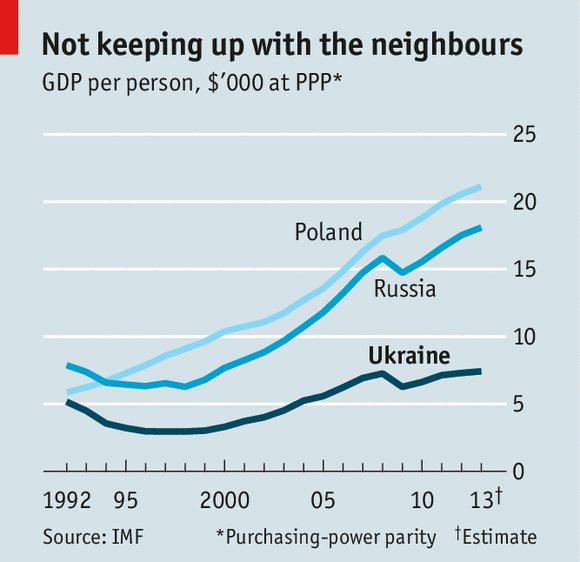

Ukraine has secured an emergency bail-out of up to $18bn (£10.9bn) from the International Monetary Fund to stave off imminent default but will see no debt relief and will be forced to slash spending amid dangerous civil conflict.
Wednesday, March 26, 2014
World Bank Scenario Foresees $150Bln Capital Flight, GDP Contraction
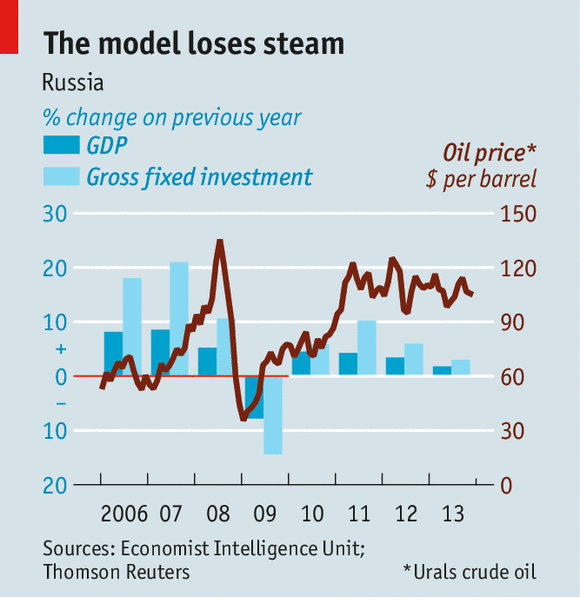
The forecast 1.8 percent contraction represents the World Bank's high-risk scenario, but still assumes the international community will refrain from trade sanctions.
In an alternative low-risk scenario, assuming only a short-lived impact from the Crimean crisis, the bank sees GDP growth of 1.1 percent this year, compared with the 2.2 percent it predicted in its last report in December.
Russia caught in US and Chinese double-pincer
Tuesday, March 25, 2014
The Future of the BBC - The Economist
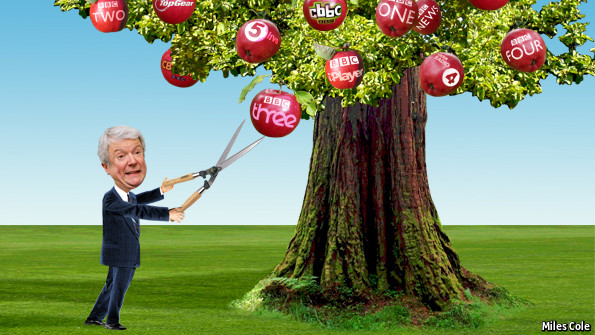
Lord Hall thinks the big predicted change in television, the demise of the channel, may happen far sooner than pundits predict. Data suggest only 2% of viewers are watching programmes exclusively online, where BBC3 is now heading. Yet tablet-savvy youngsters seem hardly to notice channels or schedules, picking and mixing content from the BBC’s two children’s channels. A step change is looming, he suspects, which will rapidly accelerate the switch to online viewing: a big problem for an outfit mostly paid for by a licence fee on television ownership. “My sense is that, although the data say that we’re canoeing down a canyon, around the corner could be the most enormous waterfall.”
If Lord Hall is truly overseeing a revolution in television-watching, the BBC will also have to change in another way. Ever since HBO launched “The Sopranos”, TV companies have understood the importance of high-class dramas for hooking viewers and building a brand. AMC, once an obscure American cable channel, did it with “Mad Men”. “Downton Abbey” helped restore the fortunes of ITV, the BBC’s commercial rival. In an online world where everything competes against everything this is all the more vital, which is why Netflix and Amazon are pouring money into shows. To compete, Lord Hall has promised another £30m for drama, which is shrewd. The BBC is respected, even loved. But in this regard it needs to become more remarkable.
Monday, March 24, 2014
Advertising is about the right questions, not the perfect answer
John Winsor: Why no advertising agency can solve every problem, and why brands must find partners that help them ask the right questions


Having the perfect answer worked in a "brand out" marketing world. But today, marketing has become "consumer in". Brands that are creating cultural questions and allowing consumers to co-create their own answers are winning the game. They are letting go of control and trusting that consumers will not only share and amplify their narratives but also build their own stories on top of their brands.
John Winsor is CEO of Victors & Spoils and chief innovation officer at Havas.
Brands should welcome entry of news publishers' into content marketing
The industry can learn about quality, and maintaining readers' loyalty, from the arrival of the Guardian and New York Times


The first native ads, for Dell, appeared on the New York Times' website last month. At the start of this month, the Washington Post's content marketing offering, BrandConnect, adopted the same long-form template used for regular editorial features, with PhRMA, the pharmaceutical industry trade body, first to sign up.
Guardian Labs, launched at the start of the year, has more than 130 people dedicated to producing quality content that just happens to be funded by brands. They're going to find a willing audience, of course. The research continues to pour out to prove marketers' insatiable appetite for content marketing. Econsultancy, for instance, brought out its Marketing Budgets Report for 2014 recently, which found 74% of brands planning to increase spend this year.
Capital controls feared in Russia after $70bn flight
Investors are withdrawing money at a rapidly increasing rate amid escalating sanctions from the West


For now the main pressure is the financial sector. Russia’s largest lender Sberbank has slashed its growth forecast to zero and warned yesterday that the economy would tip into a slump if the capital flight reaches $100bn. "The present situation has a negative impact on the economy worldwide, in Russia and in Europe," said the bank’s chief executive German Gref.
Fighting the flab - The Economist
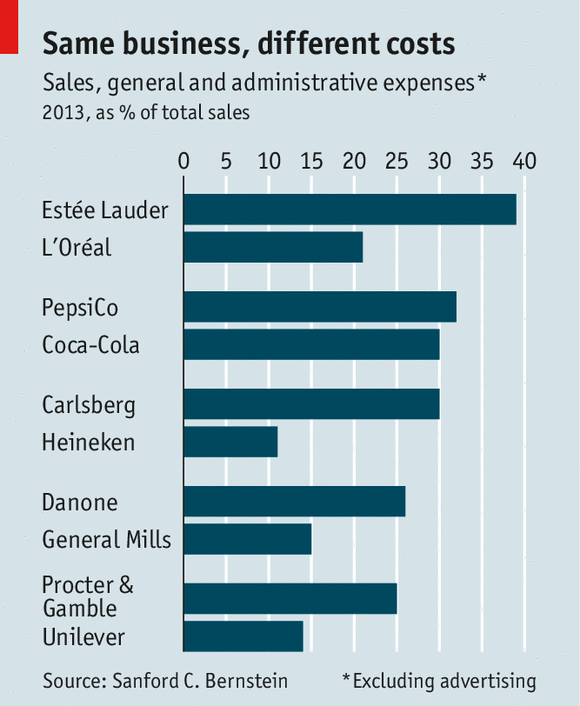
It is hard to think of many big companies that could not benefit from taking a fresh look at their overheads. One, perhaps, is Mars, a family-run confectioner with a tiny, frugal HQ in suburban Virginia. Another is Berkshire Hathaway. In this year’s letter to shareholders, sent last month, the conglomerate’s boss, Warren Buffett, broke a long-standing “no pictures” policy to show off his head-office team, just 24 strong. Mr Buffett’s last big acquisition, of Heinz, was made in partnership with 3G, a Brazilian private-equity firm whose boss, Jorge Paulo Lemann, has a passion for cost-saving. Heinz had already undergone a round of cuts under pressure from Mr Peltz. But 3G found plenty more to trim, as it applied its “zero-based budgeting” approach, in which all spending must be justified from first principles each year. Swathes of managerial jobs were axed, as was the company’s “aviation department”, which ran its corporate planes. Mr Buffett is impressed: hitherto he has mostly bought well-run firms that he could largely leave alone, but now he wants to do more deals like the Heinz one.
Sunday, March 23, 2014
Cheezburger's Ben Huh on real-time content - video
http://www.theguardian.com/global/media-network-blog/video/2014/mar/21/changing-media-summit-2014-ben-huh
Speaking at the Guardian's 2014 Changing Media Summit at Kings Place in London, founder and CEO of the online content network Cheezburger Ben Huh focused on the opportunities for brands and media owners around real-time formats. Huh works with brands to build content in what he calls native formats in order to better engage with fast-moving audiences on the web
Saturday, March 22, 2014
5 Charts That Show What A Disaster The Russian Economy Is

"The Central Bank of the Russian Federation appears to have abandoned its policy of increased currency flexibility and limited intervention in the foreign-exchange market. The Central Bank is now focused on stabilizing financial markets in light of the inflationary impact of the around 10% depreciation of the currency so far this year and the significant capital outflow, which we estimate at about $60 billion in the first quarter of 2014, similar to the level for the whole of 2013."
Lunch with the FT: Dana White By Lucy Kellaway

It is the Ultimate Fighting Championship fight night at the O2 Arena in London and White, who has made cage fighting into one of the fastest- growing sports in the world, has invited me to watch it with him. He’s also asked a curious assortment of celebrities, including Damien Hirst, Guy Ritchie, and Niall Horan from One Direction, who is excitedly tweeting: “Jesus Christ that was unbelievable! ... Some serious brawls!”
“We don’t let the media know a lot of the numbers. It pisses them off,” White declares, finishing one starter and moving on to the next. He tells me that the biggest source of revenue for UFC is pay-per-view TV – the most popular fights are watched by 1m people paying $50 each – but refuses to say anything more.
Col Needham of IMDb: ‘Everything about me is movies’
http://www.ft.com/intl/cms/s/2/01f1230c-afcb-11e3-9cd1-00144feab7de.html#axzz2wgKmXR1A

More than that, IMDb is also a symbol of the changing value of data. What began as trivia could soon be integral to the process of making movies itself. IMDb was bought by Amazon in 1998 (the price has never been disclosed), right at the beginning of the internet giant’s quest to understand the world’s consumer habits and sell us what we want. Now IMDb and Amazon are part of a changing Hollywood, trying to use our clicks, our comments, our ratings – even our ideas – to create the next billion-dollar franchise, the next Breaking Bad.

More than that, IMDb is also a symbol of the changing value of data. What began as trivia could soon be integral to the process of making movies itself. IMDb was bought by Amazon in 1998 (the price has never been disclosed), right at the beginning of the internet giant’s quest to understand the world’s consumer habits and sell us what we want. Now IMDb and Amazon are part of a changing Hollywood, trying to use our clicks, our comments, our ratings – even our ideas – to create the next billion-dollar franchise, the next Breaking Bad.
Behavioural economics and public policy - By Tim Harford

So popular is the field that behavioural economics is now often misapplied as a catch-all term to refer to almost anything that’s cool in popular social science, from the storycraft of Malcolm Gladwell, author of The Tipping Point (2000), to the empirical investigations of Steven Levitt, co-author of Freakonomics (2005).
Yet, as with any success story, the backlash has begun. Critics argue that the field is overhyped, trivial, unreliable, a smokescreen for bad policy, an intellectual dead-end – or possibly all of the above. Is behavioural economics doomed to reflect the limitations of its intellectual parents, psychology and economics? Or can it build on their strengths and offer a powerful set of tools for policy makers and academics alike?
Friday, March 21, 2014
The music industry - Beliebing in streaming
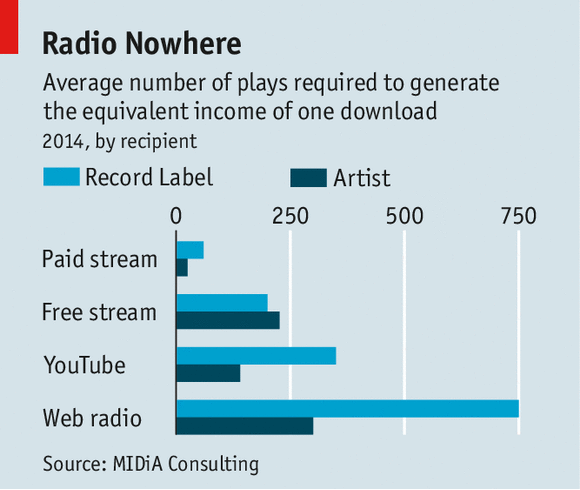
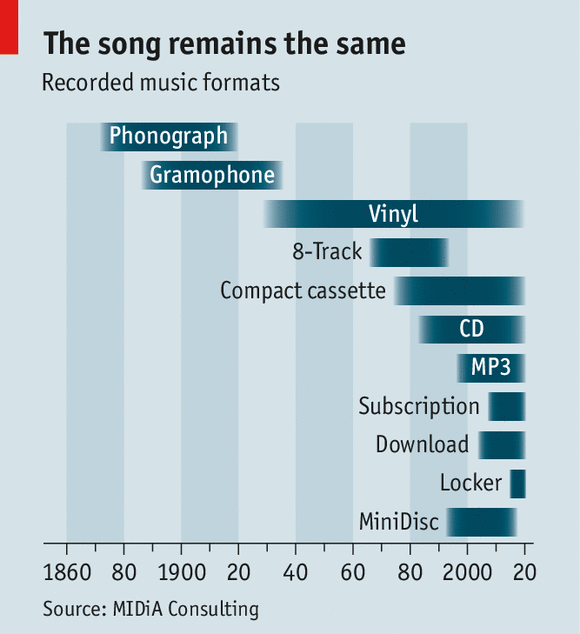
Streaming services have taken off thanks to wider smartphone adoption, faster internet connections (including 4G mobile) and the spread of cheap online “cloud” storage for music files. Even so, only 4-5% of music consumers in America and Britain have so far signed up for subscription streaming, says Mark Mulligan of MIDiA Consulting. But if just 10% of the people in rich countries were to subscribe, the industry’s fortunes would be transformed, says Claudio Aspesi of Sanford C. Bernstein, another research outfit.
Follow the roubles - The Economist

Both the American and European governments say that their measures are just a start and can be extended, depending on what Russia does next. Even if the lists are lengthened to include the families of the main targets, the sanctions will fall far short of the chokehold on Iran’s economy. Those sanctions were comparatively easy to put in place because the country was already cut off from the world economy. This is not the case for Russia. “Tough sanctions would mean saying to BP, Exxon, Chevron, Shell, Boeing and Siemens that they can’t do business in Russia,” says Fiona Hill of the Brookings Institution, a think-tank.
Viral Video Chart: Christopher Walken, Game of Thrones and cute pets
Watch Walken waltz in, Buscemi step it out with De Blasio, a cat who thinks he is an escapologist and a Disney near-disaster
1. Christopher Walken Dance No
Walken the walk, talking the talk
Walken the walk, talking the talk
2. Wes Anderson centred
Drawing a line
Drawing a line
3. Game of Thrones Season 4: Trailer #4 - Devil Inside (HBO)
Diabolical deeds
Diabolical deeds
4. Ultimate Close Call Compilation 2014 || Uniformedia
Smashing stuff
Smashing stuff
5. When the dog stays at home alone
Rover rollover
Rover rollover
6. De Blasio and Buscemi Train for the Inner Circle Show on March 22
Give me mayor …
Give me mayor …
8. KTLA St Patrick's Day Earthquake 3/17/2014
Lights, studio, action
Lights, studio, action
9. Photoshop Has Gone Too Far
Pizza to go
Pizza to go
10. Fish tank breaks at Downtown Disney's T Rex Cafe
Fin-ale
Fin-ale
Source: Viral Video Chart. Compiled from data gathered at 14:00 on 20 March 2014. The Viral Video Chart is currently based on a count of the embedded videos and links on approximately 2m blogs, as well as Facebook and Twitter.
Thursday, March 20, 2014
Game theory in Ukraine: Monopoly v chess - The Economist

People in search of a metaphor to describe the difficulty of coping with Russia these days often describe Vladimir Putin as playing chess, while the West plays some less-complicated type of game. In fact, in game-theory terms, chess is fairly simple: it is a two-person zero-sum game, where one side wins what the other side loses. More complicated games have multiple players and more than one dimension of play. In Monopoly, for example, money and territory are not the same thing, and players may form shifting alliances to maximise common interests. (Of course, in the end, one player gradually sucks up all the money and strangles the others, which may be how Russian nationalists see the West these days.) It might be more helpful to say that the West is playing Monopoly, while Mr Putin is playing chess. Mr Putin has responded to Mr Obama's offer to negotiate a possible trade of Marvin Gardens for Indiana Avenue by advancing his rook and taking an exposed pawn. How should America deal with this? Garry Kasparov, a guy who knows a fair amount about chess, recommends a series of measures that are far harsher than anything America is currently contemplating. The West might have preferred to play a non-zero-sum, multiplayer game with Mr Putin, but if he keeps playing chess, we will eventually have to start playing too.
Is your boss spying on you?

There’s an irony, perhaps, that these sensors are started to be deployed at a time when many companies are finally realising that happy employees are more productive. The effect of sensor technology on individual workers will largely depend on the culture that already exists within their workplace. There have always been bad bosses. But bad bosses with an excessive amount of your personal data could be even worse.
Wednesday, March 19, 2014
As Investors Flee, Russia Inc. Is Feeling the Pain - Bloomberg
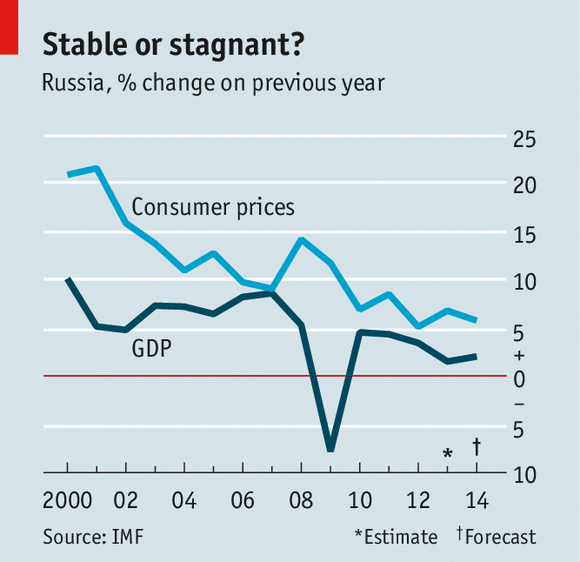
Ordinary Russians also would be hurt by capital flight. If the outflow continues at its current pace, it will total $70 billion during the first quarter, some 3.2 percent of gross domestic product. “There is a real risk that this could push Russia into recession this year,” says Capital Economics’ Shearing. Adding to the pain, the ruble has plunged 22 percent over the past year—a blow to shoppers in a country where imported goods account for more than 40 percent of consumption.
Tuesday, March 18, 2014
Why low-key launches won't work for every marketing campaign

But for Peugeot, or any other businesses out there considering this approach, it's not about finding a low-key launch strategy that will work for your brand. As with most successful marketing, it's about creating the unexpected to gain impact, or using the unexpected to build closer relationships with your fanbase (or consumers).
Brands have always done this. But previously the unexpected bit was in the message rather than the media plan or PR strategy. The job of the marketing and communications was to deliver a point of difference from its competitors, snugly wrapped in an emotional and memorable blanket.
But today we consume media differently, so the way businesses tell us about something has to be as creative and unique as the thing they're telling us about.
Why the Russian Stock Market Is Doomed to Be Cheap - Moscow Times

... the hopes of a re-rating of Russian stocks are officially dead. Russia's Ukrainian adventure has shown that it is not only the rest of the world that still views Russia through a Cold War prism: That is how the Kremlin sees itself. Putin has backed up his theatrically menacing exterior with actual force. He acted like the bad guy because, well, he is a bad guy.
Global investors never really bought the illusion that Russia is just a snowier, bad-food version of China or India, or Brazil — and thus deserving of the higher valuations usually assigned to those markets. Now, investors' doubts have been confirmed.
Today, Russia suffers from low levels of investment and enormous — and rapidly increasing — capital flight. The current crisis will exacerbate the ongoing economic slowdown. Wealth creation — for investors and for millions of Russians — is permanently stunted. And there will not be any fundamental improvement in the perception of Russia for a long time.
Digital Video - The Economist

VHX uses an account-based approach to access rather than DRM wrapping the film, and will only deliver in both streaming and downloadable versions. These films can then be freely copied and played anywhere, which is a nod to a simple truth: all films are available in pirated versions, free from any sort of restrictions, usually almost as soon as they are released. Restricting playback with DRM makes life hard for legitimate customers, while having no effect on the pirates.
Monday, March 17, 2014
Sunday, March 16, 2014
Gogglebox 2014: the funniest quotes
http://www.telegraph.co.uk/culture/tvandradio/10682968/Gogglebox-2014-the-funniest-quotes.html


Gogglebox has a simple premise: it invites us to watch a regular cast of everyday people as they watch television. Now this unsuspecting hit has made minor celebrities of some of its witty participants. These are some of our favourite quotes of the new series so far.
Why I bought this jacket
http://www.moreintelligentlife.com/content/lifestyle/rebecca-willis/style-and-influence


How ideas spread is a subject that fascinates the modern world, not least because if you understand and control that process, you can wield great commercial or political power. Memetics, which dates from the 1980s, uses the model of evolution to explain how cultural information gets transferred. It comes from the word “meme”, coined in 1976 by Richard Dawkins in “The Selfish Gene” to describe a unit of cultural inheritance that carries ideas, practices or behaviours – like a gene, though without any physical existence. Like a gene, it competes, gets passed on and mutates. Just as, in fact, the word meme has done.
Malcolm Gladwell, the writer of the (itself very influential) book “The Tipping Point”, subscribes to the epidemiological model of influence, writing that “ideas and products and messages and behaviours spread just like viruses do”. He uses fashion as one example. In the early 1990s, a handful of hipsters in downtown Manhattan started wearing Hush Puppy shoes. Within a couple of years a trend that started on a few New York feet had spread to every shopping mall in the country: America was infected with the Hush Puppy virus.
Saturday, March 15, 2014
Media in America & Russia - The Economist
http://www.economist.com/blogs/democracyinamerica/2014/03/media-america-and-russia

What's interesting about watching the Russian case is that you can see how this architecture of pluralism can be hollowed out. When governance becomes a mutually beneficial collaborative racket between billionaires and security-institution overlords, the media can be easily brought to heel. Wrap it in the flag, and you can even find sharp, beautiful, quick-thinking media people to justify the whole sordid game. For a while, at least. Cracks are starting to open up at RT itself, if only among the American staff, with anchor Abby Martin going off-script to criticise Russian interference in Ukraine, and fellow anchor Liz Wahl quitting. More impressively, the staff of Lenta.ru is currently in all-out revolt against Ms Timchenko's firing. I hope Western reporters would have the same guts.

What's interesting about watching the Russian case is that you can see how this architecture of pluralism can be hollowed out. When governance becomes a mutually beneficial collaborative racket between billionaires and security-institution overlords, the media can be easily brought to heel. Wrap it in the flag, and you can even find sharp, beautiful, quick-thinking media people to justify the whole sordid game. For a while, at least. Cracks are starting to open up at RT itself, if only among the American staff, with anchor Abby Martin going off-script to criticise Russian interference in Ukraine, and fellow anchor Liz Wahl quitting. More impressively, the staff of Lenta.ru is currently in all-out revolt against Ms Timchenko's firing. I hope Western reporters would have the same guts.
Evgeny Lebedev: 'Russia is not a homophobic country'
http://www.theguardian.com/media/2014/mar/14/evgeny-lebedev-russia-not-homophobic-country
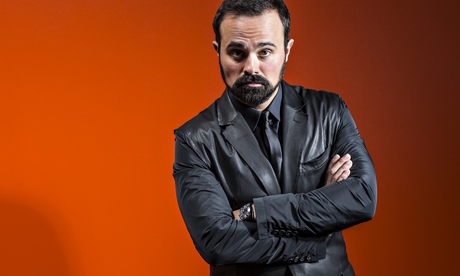
From reciting Shakespeare to curating his private library of 500 scents, Independent and London Evening Standard owner Evgeny Lebedev makes an unusual newspaper proprietor. Now he's planning to unleash himself on viewers as a TV presenter

From reciting Shakespeare to curating his private library of 500 scents, Independent and London Evening Standard owner Evgeny Lebedev makes an unusual newspaper proprietor. Now he's planning to unleash himself on viewers as a TV presenter
Friday, March 14, 2014
Ideas reinvenTED - from The Economist

Critics dismiss TED as the Starbucks of intellectual life (though YO! Sushi may be a better comparison). Evgeny Morozov, a technology pundit, says it has become “something ludicrous, and a little sinister”. Benjamin Bratton, a sociologist, goes further and suggests that TED is a recipe for “civilisational disaster”. In his view TED really stands for “middlebrow, megachurch infotainment”.
There is certainly some truth in these criticisms: any organisation that invites Sting to its 30th birthday party is in danger of jumping the shark. But criticism must be tempered by admiration for what TED has achieved. It does indeed have a weakness for celebrities. But it has also discovered hundreds of lights hidden under bushels: the most viewed TED video, with 25m downloads, features Ken Robinson, a once-obscure British educationalist. It is true that TED shrinks big ideas into bite-like chunks. But it has also demonstrated that there is a huge market for big ideas.
Viral Video Chart: Justin Bieber, Lena Dunham and Kevin Bacon
Girls in the garden of Eden, kissing with confidence, bitcoin banter and Barack Obama between two ferns


1. Biblical Movie - Saturday Night Live
Core blimey
Core blimey
2. First Kiss
Pucker up
Pucker up
3. First handjob (First Kiss Parody)
Sticky business
Sticky business
5. Bitcoin's COO Explains What bitcoin Is
On the money
On the money
6. Justin Bieber Deposition (Full Video)
All that matters
All that matters
7. Kevin Bacon Explains the '80s to Millennials
Following on
Following on
8. Comedian Movie Trailer
Hal Douglas tribute
Hal Douglas tribute
9. My 3 year old must argue and debate everything!
Listen Linda …
Listen Linda …
10. The ice-cream van
Tumble tots
Tumble tots
Source: Viral Video Chart. Compiled from data gathered at 14:00 on 13 March 2014. The Viral Video Chart is currently based on a count of the embedded videos and links on approximately 2m blogs, as well as Facebook and Twitter.
Subscribe to:
Posts (Atom)


